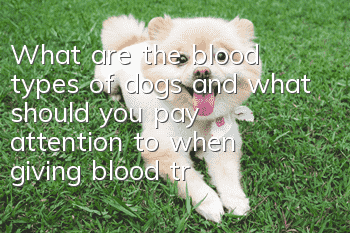What are the blood types of dogs and what should you pay attention to when giving blood transfusions to dogs?

Everyone is familiar with the four blood types of humans, A, B, AB, and O, as well as the distinction between negative and positive, but do you know what these letters represent? In fact, the basis for distinguishing blood types is the most important antigen in blood cells (which is Types of proteins and sugars produced by the human immune system on the surface of blood cells. The most amazing of them is type O blood. This means that there are no antigens in your cells. This is why type O blood is a universal blood type and does not produce any antigens with other blood types. The reason for resistance.
What are the blood types of dogs?
There is also such a magical universal blood type DEA4 in the blood of dogs. Most of the dog breeds with this type of blood are greyhounds, so greyhounds are often used as blood donor dogs abroad. Including DEA4, there are eight most commonly recognized dog blood types internationally, and they are divided into negative and positive just like humans.
Dog blood type and distribution probability
What would happen if a dog was given a different type of blood?
On Weibo, owners often ask for help because their dogs are injured, hoping to find dogs of the same breed for blood transfusions to help their dogs survive the pain. But in fact, dogs cannot accept antibodies of different blood types than their own. After the first transfusion of blood of a different blood type, the blood type may change. If a blood transfusion is needed for the second time, it will become very difficult because it will be very difficult to find the right blood. The probability of the source will become very small.
The most serious situation should be a mixture of negative blood and positive blood. When a dog with DEA1.1 negative blood is transfused with DEA1.1 positive blood, the immune system will take a longer time to respond for the first time, so There will not be much reaction, but when encountering mismatched blood transfusion for the second time, dogs with DEA1.1 negative blood will have a strong discomfort reaction, and this reaction can even be life-threatening.
Blood transfusion combination chart
Note: The cases that usually require dogs to undergo blood transfusion include vomiting blood caused by accidental ingestion, sudden bleeding (the most common is a car accident), massive blood loss caused by surgical accidents, parasites, etc. Most of them are sudden accidents, so it is best to While giving your dog a physical examination, test his blood type in case of emergency.
Can dogs with different blood types breed babies?
In fact, this probability is relatively low, but to be on the safe side, it is best to know the blood type of the other dog when choosing a breeding partner. If a female dog with DEA1.1 negative blood gives birth to 7 puppies, 2 of them have different blood types from the female dog. If the baby survives by chance, the newborn may die of hemolysis during the feeding of breast milk (usually in about a week). Because the mother's milk contains the same antibodies as the blood, puppies with incompatible blood types will have their red blood cells attacked.
What should you pay attention to if you want to take your dog to donate blood?
· Usually priority is given to large dogs of about 50 pounds;
· Female dogs that have been neutered or have never been bred;
· Before donating blood, you must be free from any diseases and parasites and be in good health;
·Age 1-8 years old;
· Be fully vaccinated and receive vaccinations regularly;
· Never taken any medicine;
Note: The amount of blood to be drawn is determined by the doctor after assessing the dog’s health and size~
Dogs that meet the above conditions can donate blood 4 times a year (maximum). Of course, parents also need to take their dogs to the hospital regularly for full physical examinations to ensure their dogs’ health.
- How to remove dental calculus in dogs
- How to train a Chow Chow to urinate and defecate in a designated place? The dog’s education should not be underestimated!
- How should Alaskan dogs be fed? Alaskan Malamute feeding guidelines!
- Dogs “like” these kinds of foods, but many people don’t know it!
- Don’t use rough methods when training golden retrievers!
- How to treat dog arthritis? The savior of dog arthritis is here!
- Why does a dog drool?
- What foods can’t Pomeranians eat?
- What should golden retriever dogs pay attention to when drinking water?
- 10 situations in which rabies vaccination is not required



